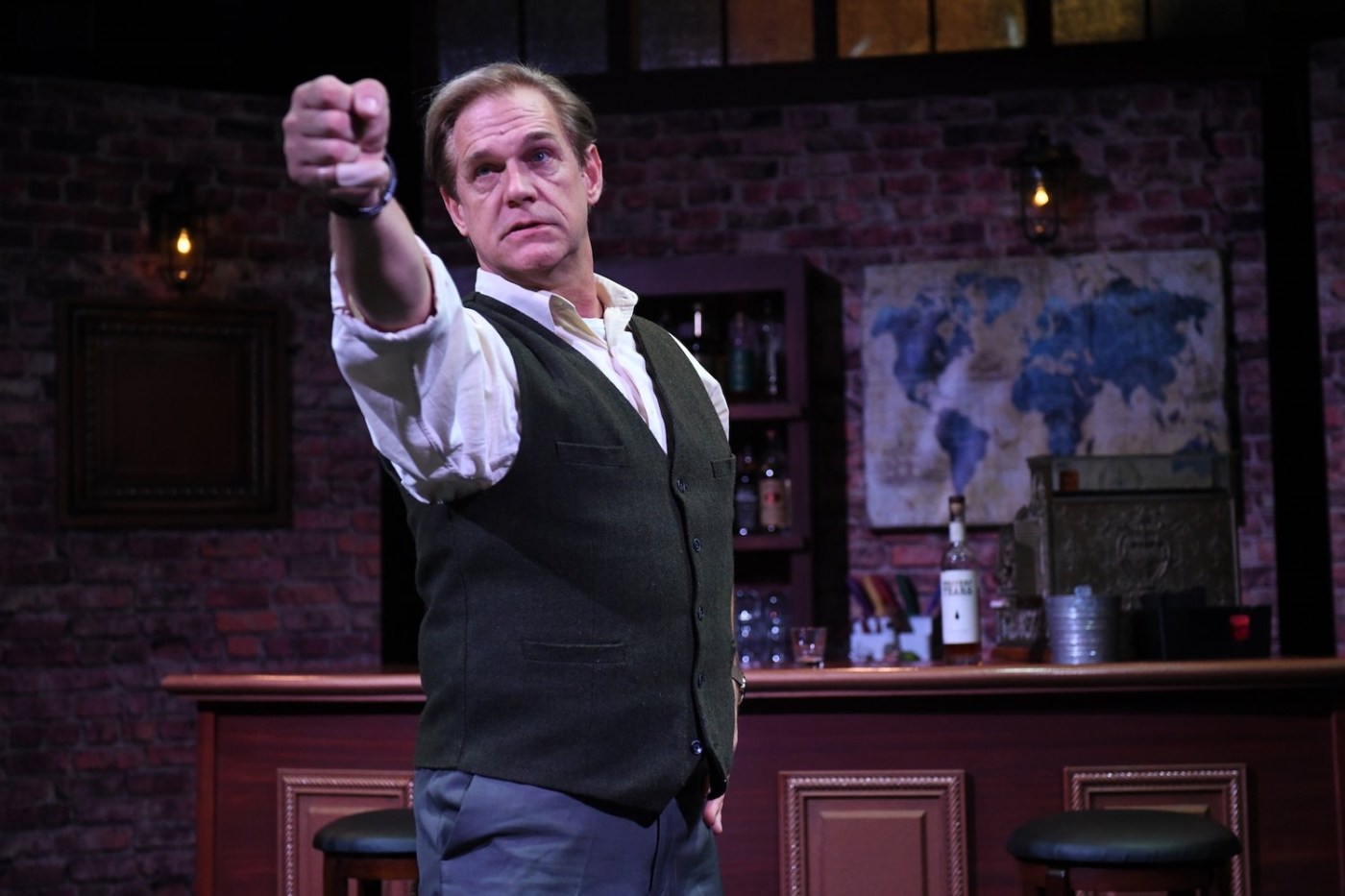There’s no one way to define the “American Dream.” And the nature of that will depend on who is trying to access that dream’s nuance.
Take Tim Finnegan for instance. His answer to said dream is serving drinks as a bartender with panache. He leans in deeply to his role as resident everyman with a discerning ear, offering a place where customers often confess sins that were “piling up like a feast.” But as an immigrant, even despite the advantages of his skin color, his American Dream is one in constant deferment.
Not long after we learn that Tim’s skills as a barkeep are no longer welcome, we observe his newest career shift — serving up people to places in the form of human trafficking.
In San Jose Stage’s production of Ronán Noone’s “The Smuggler,” actor Jonathan Rhys Williams is tasked to deliver a lengthy, energetic monologue that offers jilted meter and assonance over 85 harrowing minutes. The action can be tricky to track, and sometimes the material veers into lull territory, but Noone’s writing offers Williams plenty of opportunity to wail all over the stage, playing the audience like a uilleann pipe.
Tim is an affable ol’ cuss, speaking constantly in soft and firm rhymes, showing off his vocal dexterity to the barflies who pull up chairs and sip on pints or some top shelf whiskey in a Massachusetts watering hole. He whips poetic combos off his Irish tongue, pairings which may include brittle, sickle tickle, cucumber and Pinot Noir; clearly, Tim will never be confused with fellow Irish poets such as Joyce or Yeats.
That locale that houses the bar is critical to the tale. The sleepy summer establishment is housed in affluent Amity, the setting for the massive tension crafted between locals and the migrant population due to the fatal car crash of one whose gross recklessness led to his own death. The undocumented survivor in the other vehicle, despite not doing anything wrong except surviving, sets the town in motion to remind folks what it means to be American, casting a pall over all.
Not long after the inciting incident, Tim’s bartending gig, while allowing him to share his full joviality with customers, eventually disappears, providing his wife Tina a chance to offer a not-so-subtle reminder of responsibilities as man of the house. She clearly states her lack of desire for their potential entry into “white trash” territory. “Timothy,” as she calls him when she’s full of rage, needs to step up and make some quick magic and a quicker buck happen. Their reputation and their small tyke’s appetite are counting on something to turn around, and fast.
The play finds its footing as it moves through space and reaches more urgent levels, with bartending giving way to trafficking. As he wends his way through the perilous story, Williams continuously discovers the sweet balance between telling the tale and crafting tension, making the recollection more effective. Director Johnny Moreno is keenly aware of the rhythms that Williams possesses, and exploits those neatly.
The play itself does not always serve as an edge-of-your-seat thriller, with the transition between two plot points clunky. The setting of the bar is clean and designed with effectively muted strokes by Robert Pickering, spilling over to those customers in the front row who get a special pour from Tim. Aaron Gin’s lighting design splashes the acting area with enough color to accentuate many of the story’s critical points.
The strength of the story is how the heat gets hot, but the added humor is quite funny. Consider a bit that involves a biting rat, which seemingly pops up out of nowhere and serves as a delightful texture to a varied story. Williams is at his best and most dexterous in moments like these, the full alchemy between him and Moreno reaching sharp heights, with some witty and unifying soundplay from Steve Schoenbeck’s design.
By the conclusion, the overarching theme of how the privileged few are offered the full amenities of live in the United States is exploited. Noone’s play asks the right questions with disturbingly clear violence. Witnessing the Walter Whiting of Tim as he breaks bad is its own sad poetry, worthy of Walt Whitman himself. After all, Tim may hear America singing, but due to his personal caste in society, it’s certainly not a tune he’s allowed to croon along with.
David John Chávez is chair of the American Theatre Critics Association and a two-time juror for the Pulitzer Prize for Drama (‘22-‘23); @davidjchavez.
‘THE SMUGGLER’
By Ronán Noone, presented by San Jose Stage Company
Through: Oct. 13
Where: San Jose Stage, 490 S.1st St., San Jose
Running time: 85 minutes, no intermission
Tickets: $17-$74; www.thestage.org












